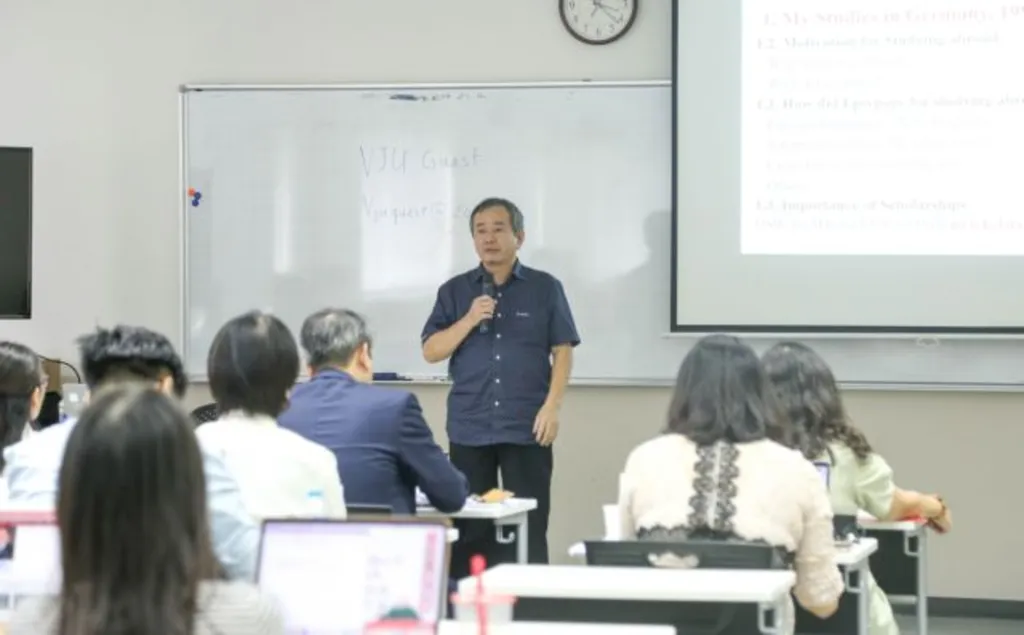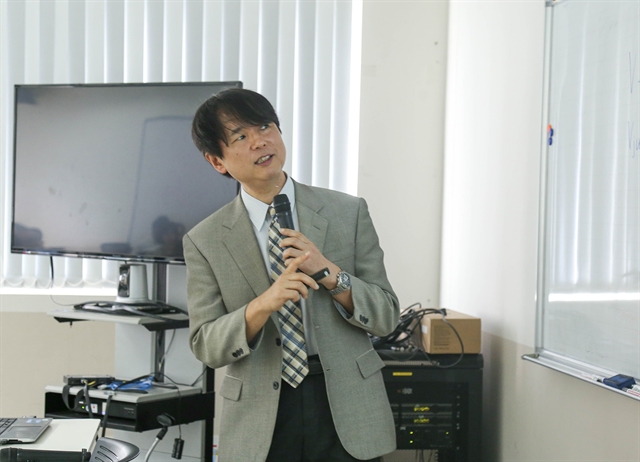 Society
Society

 |
| Professor Phạm Hồng Tung at a seminar on Tuesday in Hà Nội. — Photo courtesy of Việt Nam - Japan University |
By Nguyễn Hằng
HÀ NỘI — Returning Việt Nam in 2002 after 10 years of studying in Germany, Professor Phạm Hồng Tung says the years and months he studied abroad were something more than just academic education.
He not only learned academic knowledge but also learned foreign languages and critical thinking. He also has had contacts with international colleagues and universities.
It helped Tung when he returned home and continued his work at the Việt Nam National University, he said.
Tung said thanks to being fluent in foreign languages, he and his colleagues at VNU were confident to invite reputed professors from foreign countries to come to teach students in domestic universities.
Besides, he and his colleagues were also confident to participate international academic forums without language barriers.
Keeping contact with foreign colleagues and universities after graduation also assisted Tung to boost collaboration and joint research between VNU with prestigious universities around the world, he added.
“Lecturers who studied abroad and returned to Việt Nam to serve have played a pioneering role in international integration in the education sector in Việt Nam,” he said.
Tung is now the director of the Institute of Vietnamese Studies and Development Science under the VNU, and Director of the Master's programme in Global Leadership at the Việt Nam–Japan University.
 |
| Professor Lê Minh Thắng (centre) and her students at a lab at Hà Nội University of Science and Technology. — VNA/VNS Photo Phương Hoa |
Phùng Lan Hương, Head of External Affairs Office at Hà Nội University of Science and Technology (HUST), said that she also studied in Germany and returned to work at the university.
Hương said after studying abroad then returning to work at the university, lecturers could develop joint training programmes and do joint research.
They also received funds from foreign countries for research activities, she said.
The university now has had a policy to increase the number of HUST alumni studying abroad, she said.
“HUST alumni are believed to be very important to the development of the university,” she said.
Currently, the number of HUST alumni in the world is 200,000, she added.
Last October the university already established HUST alumni in Japan with the chairman of the alumni association is a Vietnamese Associate Professor working at Tokyo University, she said.
Tung, Hương and colleagues who studied abroad contribute to building the new stature of higher education and scientific research in Việt Nam.
JICA research
Research on studying abroad and its impact on higher education development in Southeast Asia by the Japan International Cooperation Agency (JICA) Ogata Sadako Research Institute for Peace and Development, revealed on Tuesday that the study abroad of lecturers had positive impacts on education, research and social contributions, as well as the development of higher education in Việt Nam.
The research is based on extensive data collected from approximately 3,300 questionnaires and more than 100 interviews, conducted between 2019 and 2022, for lecturers from the top 10 universities in Việt Nam, Cambodia, Indonesia and Malaysia.
In Việt Nam, the research team, led by Kazuo Kuroda, Professor at Graduate School of Asia-Pacific Studies, Waseda University and Jung Hyun Jasmine Ryu, lecturer at Việt Nam – Japan University, had conducted a survey at the two leading universities of VNU and HUST.
The research pointed out that foreign language acquisition through studying abroad in Việt Nam has a special meaning compared to other countries in ASEAN.
Moreover, it is worth noting that Japan has a policy to promote academic cooperation with former international students.
 |
| Nobuko Kayashima, Senior Research Advisor at JICA Ogata Sadako Research Institute for Peace and Development presents the research at a seminar on Tuesday in Hà Nội. — Photo courtesy of Việt Nam - Japan University |
Nobuko Kayashima, Senior Research Advisor at JICA Ogata Sadako Research Institute for Peace and Development, said the research project was an initiative of the institute that has great importance thanks to an increasingly globalised world, and the role that studying abroad can have in developing poorer countries.
There are still very few studies about the impacts of studying abroad on an institutional level, she said, with most focussing on how it impacts the individual.
Kayashima also added that Việt Nam has a developing higher education system and nowadays, at the master level, there are more lecturers of VNU and HUST, with domestically-earned degrees compared to those who studied abroad.
However, lecturers need to have international exposure and experiences to improve their methods, she said.
Việt Nam is advised to give lecturers some short training abroad, sending them to participate international conferences in other countries, or to accept international students in master programmes in the country.
Japanese policies to VN
 |
| Kazuo Kuroda, Professor at Graduate School of Asia-Pacific Studies, Waseda University at a seminar on Tuesday in Hà Nội. — Photo courtesy of Việt Nam - Japan University |
Kazuo Kuroda, Professor at the Graduate School of Asia-Pacific Studies, Waseda University said recently that Japan has completed a study committee on new international student policies.
Vietnamese students account for 23.5 per cent of the total number of international students studying in Japan. Việt Nam ranks second among countries sending students to study in Japan, he said.
Việt Nam is one of the most important countries for the Japanese higher education system in terms of internationalisation and students’ mobility, not only because the of number of Vietnamese students but also because Việt Nam’s trade is very important in the Free and Open Indo-Pacific strategy of the Japanese diplomacy.
International students' mobility between Việt Nam and Japan is expected to facilitate economic cooperation between the two countries.
“We are targeting international students' mobility between the Việt Nam and Japan. It’s a strategy,” he said.
Also now, we are concerned about sending more Japanese students to study in Việt Nam, he said.
"Because of the important relationship between the two countries, we should also have more Japanese students and staff coming to understand Việt Nam," he said. — VNS